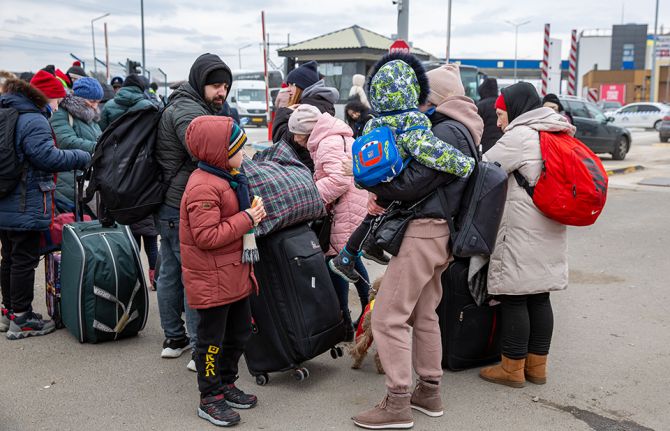



Press Statement
Health partners race to secure life-saving HIV medicines and services for people affected by the war in Ukraine
05 April 2022 05 April 2022As shipments of antiretroviral treatment arrive, challenges are mounting to ensure it reaches those in need
GENEVA, 5 April 2022—The war in Ukraine has resulted in a catastrophic humanitarian crisis with rapidly growing numbers of deaths and casualties, the destruction of entire cities and towns and unconscionable attacks on health facilities and other civilian targets. This is putting Ukrainians living with HIV in grave danger.
“It is becoming increasingly difficult for people to access the health care they need, including services for HIV,” said Winnie Byanyima, Executive Director of UNAIDS. “UNAIDS estimates that 260 000 people were living with HIV in Ukraine before the war broke out, 152 000 of whom were taking daily medication for HIV. There is no cure for HIV. Without access to antiretroviral medicines people living with HIV will die.”
The World Health Organization estimates that there have been 82 separate attacks on hospitals, ambulances and doctors in Ukraine since the war began, killing 72 and injuring at least 43 people. Nearly 50% of Ukraine’s pharmacies are presumed to be closed and many health workers are either displaced or unable to work.
UNAIDS with its cosponsors WHO and UNICEF together with USAID, PEPFAR, and the Global Fund to Fight AIDS, TB and Malaria are working to ensure a 12-month supply of the medicines for people living with HIV in Ukraine. A delivery of 209 000, 90-day supplies of antiretroviral medicines has arrived in Lviv, Ukraine ready to be distributed to people in need. However, distribution within Ukraine is set to be a challenge, particularly in conflict areas. UNAIDS urges respect for and protection of humanitarian corridors to allow for the distribution of humanitarian aid and safe passage for civilians to safety.
The UN Secretary-General has called for “unimpeded access to all affected people and communities” to be guaranteed, and for an end to the war.
“Through remarkable efforts by civil society and government, most sites providing antiretroviral therapy are still at least partially functioning, but the war has disrupted supply chains and patients’ access to those sites,” said Ms Byanyima. “Partners on the ground are scrambling to get lifesaving medicines to people safely. The flexible ability of civil society to reach people is vital and funds are urgently needed to support and strengthen these critical life-lines.”
UNAIDS has issued an appeal for funds to support people living with HIV and key populations with access to HIV services and basic humanitarian needs including the uninterrupted provision of HIV treatment and harm reduction services such as opioid substitution therapy (OST—an effective treatment for dependence on opioids). People living with HIV are urged to contact the Ukrainian HIV hotline number* for more information on the availability of HIV treatment.
A number of prisons are no longer controlled by the government of Ukraine. Prisoners in need must have access to antiretroviral therapy for HIV, or OST (in the case of dependence on opioids).
More than 4 million refugees have fled Ukraine since the war began. It is estimated that up to 1% of refugees could be living with HIV and in need HIV services. UNAIDS with its cosponsors WHO and UNHCR have held talks with the neighbouring countries of Romania, Slovakia, Moldova, Hungary and Poland to brief their respective capitals and health officials on the needs of refugees living with HIV as well as the importance of providing HIV prevention services.
As part of efforts to ensure continuity of HIV treatment, UNAIDS and cosponsor WHO have helped broker a deal with the pharmaceutical company ViiV Healthcare to provide donations of HIV medicines to Poland, the Czech Republic and other European Union countries receiving large numbers of Ukrainian refugees. More support for Ukrainian refugees living with HIV can be found on the ART Initiative for Ukrainians Abroad website which was established in coordination with Ukraine’s Public Health Centre.
The World Health Organization is working with Ukraine’s Public Health Centre on collecting data, while maintaining confidentiality, to understand the whereabouts and needs of people living with HIV affected by the war. There is currently no precise data on the movements of people living with HIV who have already left the country.
UNAIDS is monitoring the situation and closely and working with civil society organizations to support refugees and people living with HIV in Ukraine. UNAIDS is also working to ensure people from key populations including the LGBTI community both in Ukraine and those who have left the country have access to humanitarian services.
*HIV hotline number in Ukraine: 0800 500 451
UNAIDS
The Joint United Nations Programme on HIV/AIDS (UNAIDS) leads and inspires the world to achieve its shared vision of zero new HIV infections, zero discrimination and zero AIDS-related deaths. UNAIDS unites the efforts of 11 UN organizations—UNHCR, UNICEF, WFP, UNDP, UNFPA, UNODC, UN Women, ILO, UNESCO, WHO and the World Bank—and works closely with global and national partners towards ending the AIDS epidemic by 2030 as part of the Sustainable Development Goals. Learn more at unaids.org and connect with us on Facebook, Twitter, Instagram and YouTube.
Contact
UNAIDS GenevaSophie Barton-Knott
tel. +41 79 514 68 96
bartonknotts@unaids.org
UNAIDS Media
communications@unaids.org
